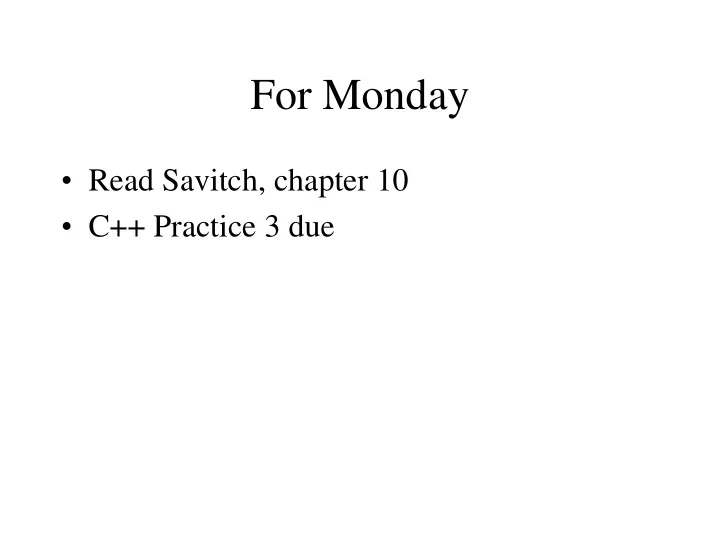

For Monday • Read Savitch, chapter 10 • C++ Practice 3 due
Program Quality
Vector Class • Rather similar to the ArrayList class in Java • Basically a resizable array class
C-Strings • Arrays ending in the null character • Can be initialized at declaration to a string literal using =. • Once declared, = will NOT work correctly to copy a C-string • == does NOT work with C-strings • If you work with C-strings – use the functions described on pages 375-376 of Savitch
String I/O • Printing strings is very straightforward • Reading them can be more of an issue • >> will read one “word” • To read a whole line, use getline – Member function for C-strings – Function that accepts a stream and a string parameter for string class strings
Character I/O • get • put • putback • peek • ignore
Using Characters • There are a number of built-in functions for manipulating or answering questions about characters.
string class • Very similar to Java‟s in many ways • Benefits from C++ operator overloading (=, ==, and [] all work as expected) • Use c_str to convert to C-string
Operator Overloading • Really just a function. • Often may be either member function or not. • Name of the function is operator followed by the symbol. • Parameters are generally const reference.
Commonly Overloaded • == • << • >> • Others depend on the kind of thing
When to Overload
Friend Functions • What? • Why? • How?
Pointers • Value is a memory address • Similar to references • Can manipulate the value of the address directly • Must explicitly dereference the pointer to access the thing being referred to (or pointed at)
Declaring Pointers int *p, *q; char *str; Student *stuPtr;
Notes on Pointers • In a multi-variable declaration, the * is required for each individual variable • The * is not part of the name of the variable; it is part of the type • Each pointer has an associated type, called the target type • The target type does not affect the actual value of the variable, but it does affect C++‟s manipulation of the variable
Values of Pointers • Pointers are not automatically initialized to anything • You must place an address in them • Size of pointers varies based on the capabilities of the machine • Often pointers are the same size as longs
The Address Operator • Allows us to determine the address of an item in memory.
The Address Operator int v, *ptr; double x, *y; ptr = &v; y = &x;
Dereferencing Pointers • Use the asterisk before the pointer variable v = *ptr;
Comments • Do not dereference a pointer unless the address points to an appropriate value • NULL is usually used as the value to indicate a pointer that is pointing to nothing • NULL is actually the 0 value pointer
Practice with Pointers • Write a declaration-initialization to establish a pointer, charPtr, to a location that stores a character and place the letter „B‟ in that location. Declare any other variable necessary.
Arrays and Pointers • What is an array name? • If we declare int numArray[10]; what is the value of numArray?
Arrays and Pointers • The name of an array is a constant pointer • That is, numArray is the address of numArray[0]
Using Pointers As Arrays int scoreArray[10]; int *scorePtr = scoreArray; *scorePtr = 10; scoreArray[1] = 12; scorePtr[2] = 11;
Addresses of Array Elements • Address of array elements are computed by adding the address of the first element to the product of the size of the elements and the element index • Thus in an integer array ar starting at address 100, the address of ar[2] would be 100 + 2 *sizeof(int) or 108 if we assume 4 byte integers
You Try It • We have the following declarations: char carr[10]; long larr[20]; • Assume chars are 1 byte and longs are 4 bytes. • The address of carr is 240 and the address of larr is 320 • What is the address of carr[6]? • What is the address of larr[4]?
Pointer Arithmetic • We can actually do arithmetic (addition and subtraction) with pointers • This works very much like the computation to find an element in an array • You take the current value of the pointer and add the number being added times the size of the target data type
Pointer Arithmetic Practice • Given: int *ptr1; char *ptr2; float *ptr3; • What is: ptr1 + 5 ptr2 + 11 ptr3 + 3
Final Note • For any array a: a[i] == *(a+i)
Recommend
More recommend